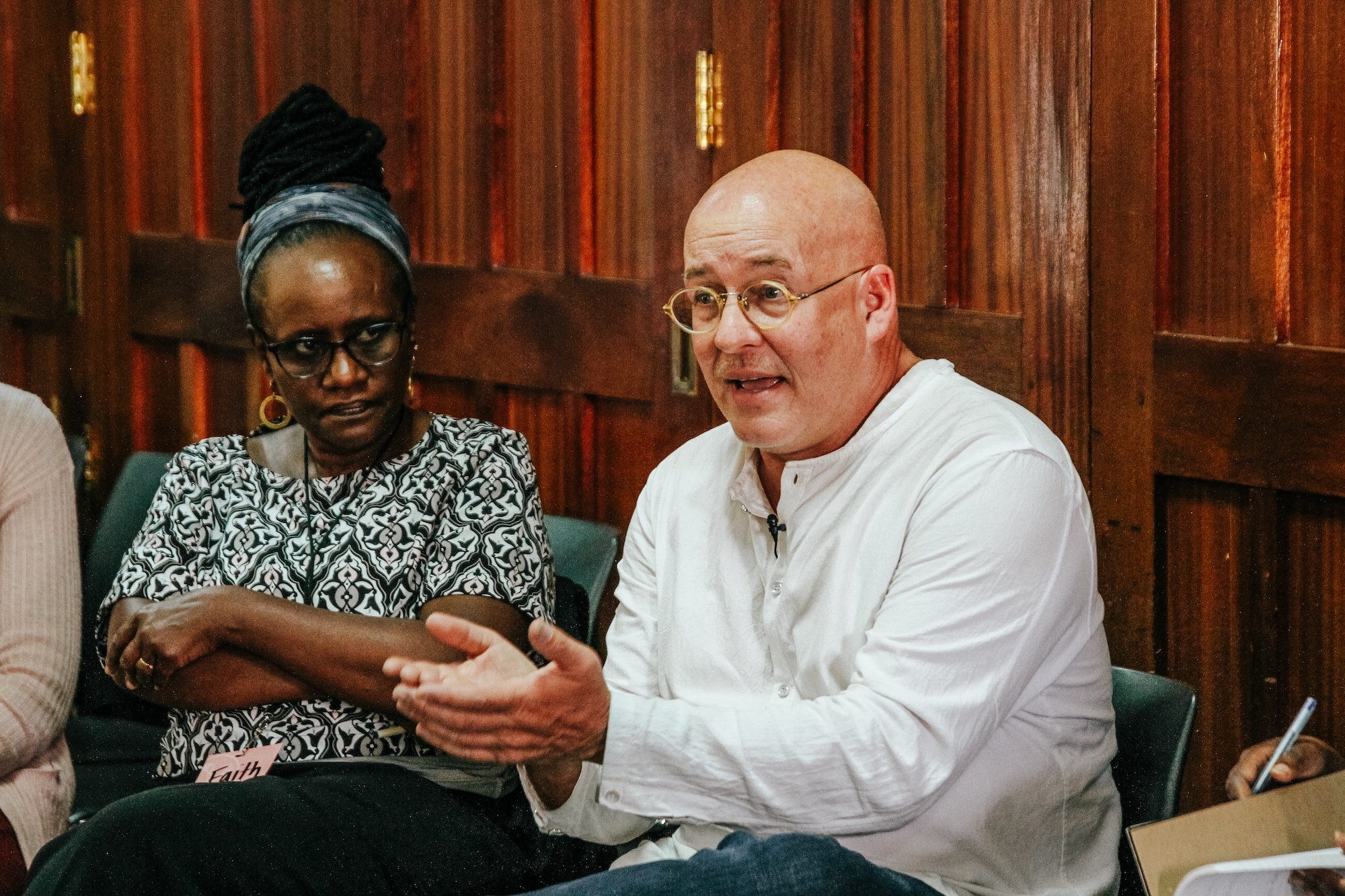
One evening in 2017, Dr. Grant Horner had just finished conducting a plenary talk in Manhattan when he came face-to-face with a continent-sized proposal.
“How’d you like to help me start a thousand classical schools in Africa?”
Horner’s answer was equally frank.
“Sign me up!”
The encounter between Horner and Karen Elliott, the executive director of the Rafiki Foundation, began a trans-Atlantic partnership that has since incorporated Horner into an enormous effort to revolutionize schooling in East Africa. Most recently in October, he made an important trip to join Rafiki conferences in Kenya and Uganda, where he and other educators introduced hundreds of African teachers, parents, and leaders to the value of a classical Christian education.
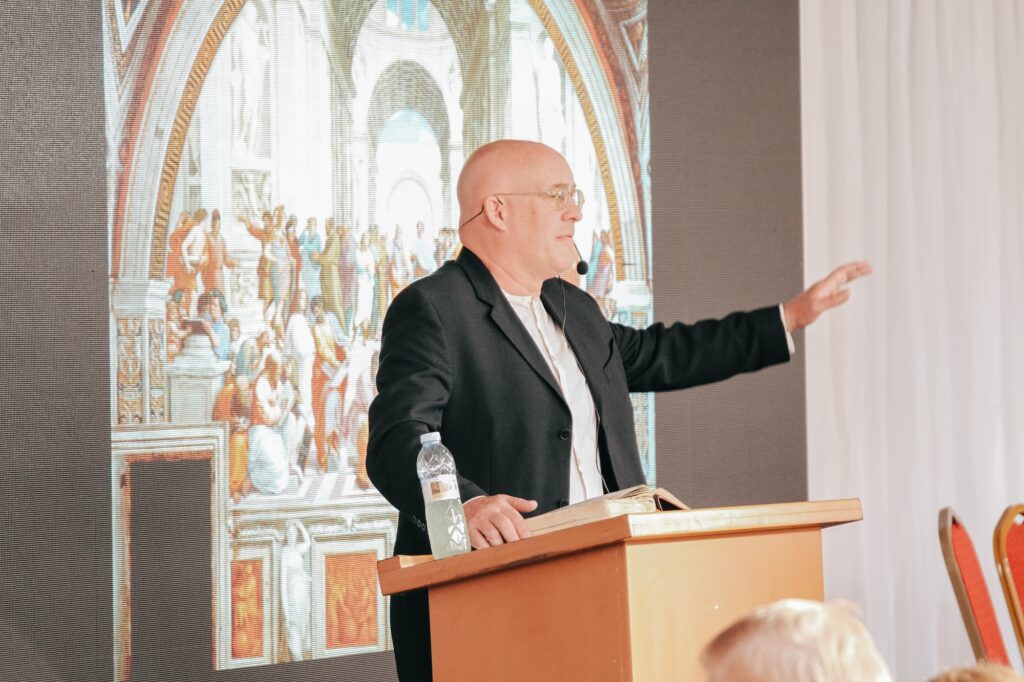
At conferences in Africa last October, Horner conducted plenary talks and Socratic method trainings to bring the classical approach to life. Photo courtesy of Rafiki Foundation.
The Rafiki Foundation’s investment in the classical approach stems from its larger effort to transform Africa by providing the next generation with spiritual care and academic training. Rafiki has taken on the mantle of transmitting classical Christian education to hundreds of students in its educational facilities and partnering church schools. Now, through agreements with key leaders, their curriculum is expanding across East Africa.
Horner is a professor of English, Renaissance, and Reformation and the director of the classical liberal arts program at The Master’s University. He also serves as a regional director for the Alcuin Fellowship, a think tank of classical educators that hosts educational conferences for teachers around the country. It was at one such retreat that Horner and Elliott met and began brainstorming on how Alcuin’s resources could carry the classical approach across the Atlantic.
During the conferences in Africa last October, Horner and other Alcuin fellows shaped a vision for what classical education could look like in a uniquely African context — not replacing the cultural heritage, but building upon it. Where some have associated classical education exclusively with Europe, Horner points to a Mediterranean origin, identifying key church fathers who initiated the movement – like Athanasius, Tertullian, and the formidable Augustine.
Horner says, “Our goal was to communicate to them what classical Christian education is, help them understand that its roots — the original formulizers of theology in the post-apostolic age — were Levantine and North African, and then to challenge them to investigate it.”
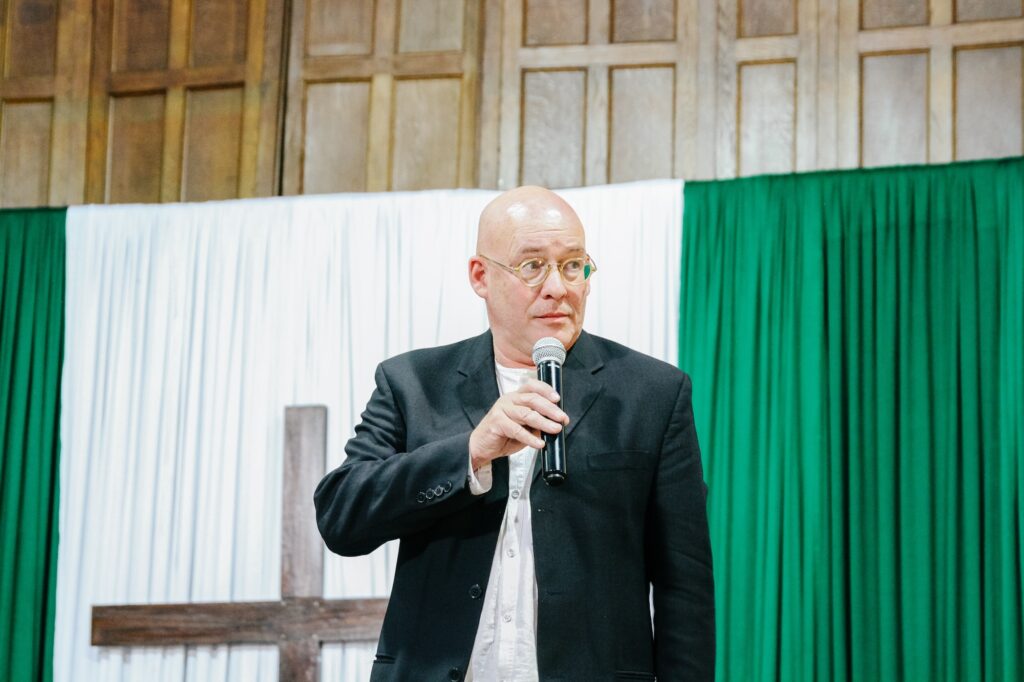
Horner is the founder of TMU’s classical liberal arts program, which is developing the next generation of classical teachers. Photo courtesy of Rafiki Foundation.
As part of the conferences, meetings were held with decision-makers representing various denominations and educational systems in East Africa. Many indicated their desire to implement Rafiki’s curriculum in their own institutions — an effort that will affect at least a thousand schools and hundreds of thousands of children.
Horner’s involvement with classical Christian education goes back a long way. He first made contact with the movement in the 80s, when its initial seeds were being planted. The call for a radically different but historically grounded form of schooling didn’t impress him much in the beginning.
“This will never take off,” he thought.
Two decades later, when the movement had exploded across America, Horner would become one of its foremost academics, designing the high school humanities program at Trinity Classical Academy in Santa Clarita, one of the country’s top classical schools. This was followed by his development of the classical liberal arts (CLA) program at TMU, the first of its kind in the United States.
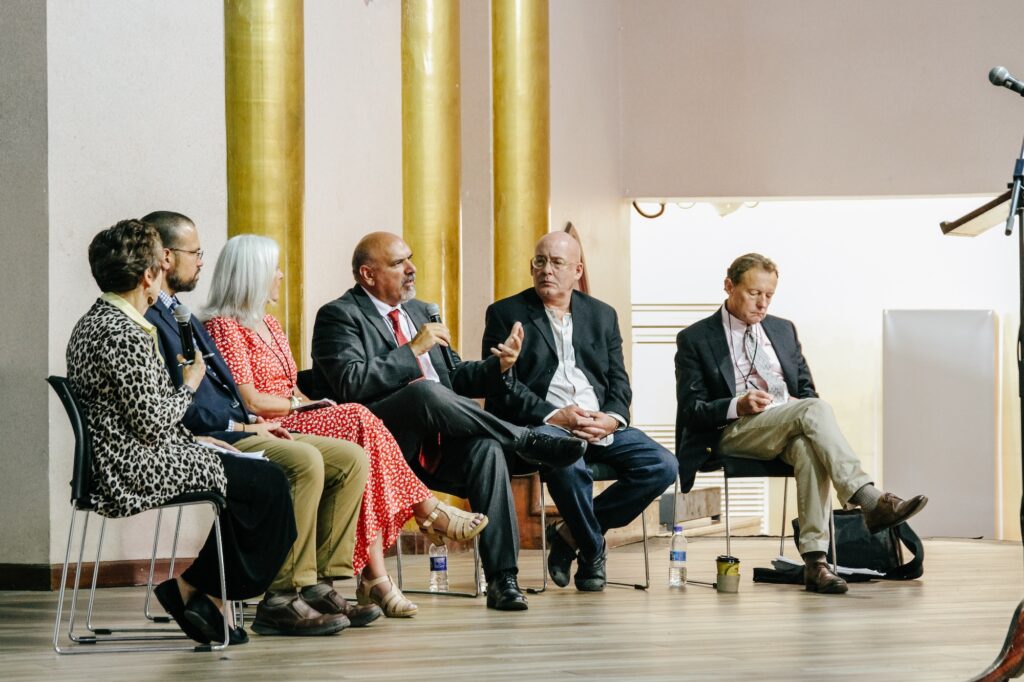
Last October, Horner and other educators crafted a vision for how classical education could serve Africa’s needs. Photo courtesy of Rafiki Foundation.
Now, having already sent out dozens of well-equipped students from the program, Horner believes that the same model of education could transform lives across East Africa.
“The classical approach is asking, ‘Where do I find goodness, truth, and beauty in my culture? And why do all of us have a sense of goodness, of truth, and of beauty — whether we are in the jungles of Borneo or urban Manhattan?’” he says.
One of Horner’s very first graduates from the CLA program, Tate Dafoe (maiden name England), has seen the growth of the classical movement in Africa firsthand. Dafoe, who was classically schooled even before coming to TMU, has made five trips to Rwanda since high school to help train both teachers and students. She emphasized the importance of having Western educators partner in the organization’s mission.
She said, “The teachers there have the vision for it, but they don’t really know what it looks like in practice. To have people who have studied or learned under classical education is very helpful for them.”
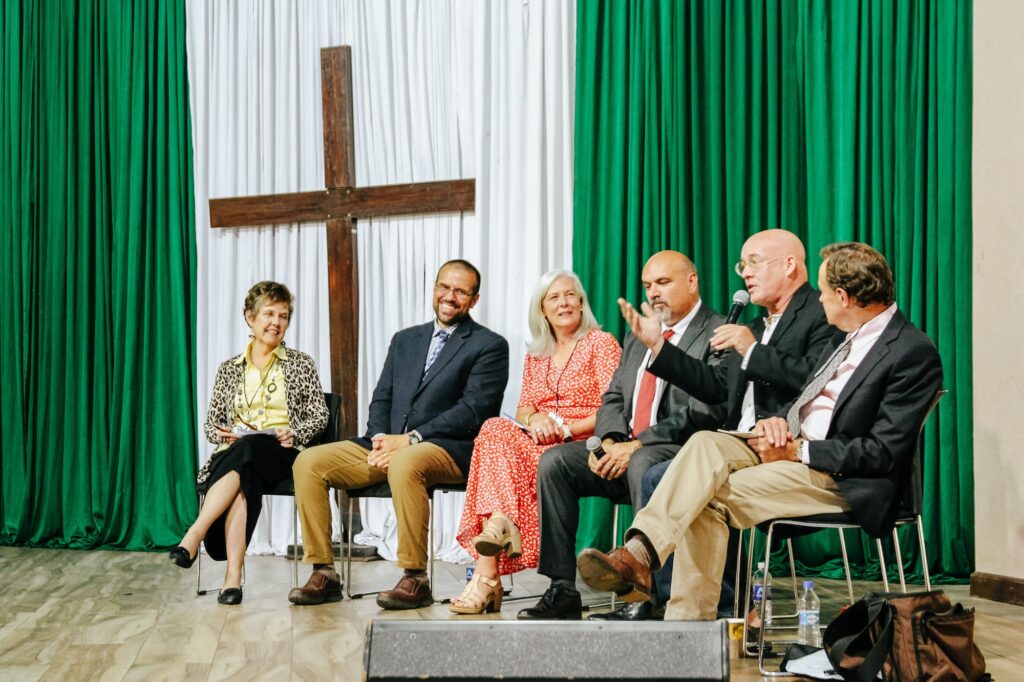
Horner is part of the Alcuin Fellowship, which provides teacher training and recruits support for Rafiki’s efforts. Photo courtesy of Rafiki Foundation.
Horner and the Alcuin Fellowship will continue to provide materials, run training sessions, and recruit teachers to assist Rafiki. The cross-cultural connection could prove valuable for students in the advancing African schools as well as students in Horner’s own program seeking to serve abroad.
Dafoe explained, “I think it would be a great opportunity for other CLA majors to go over there for a month and help out in teaching a few courses, seeing what it looks like on a different continent. I know that it’s as beneficial for us as it is for them.”
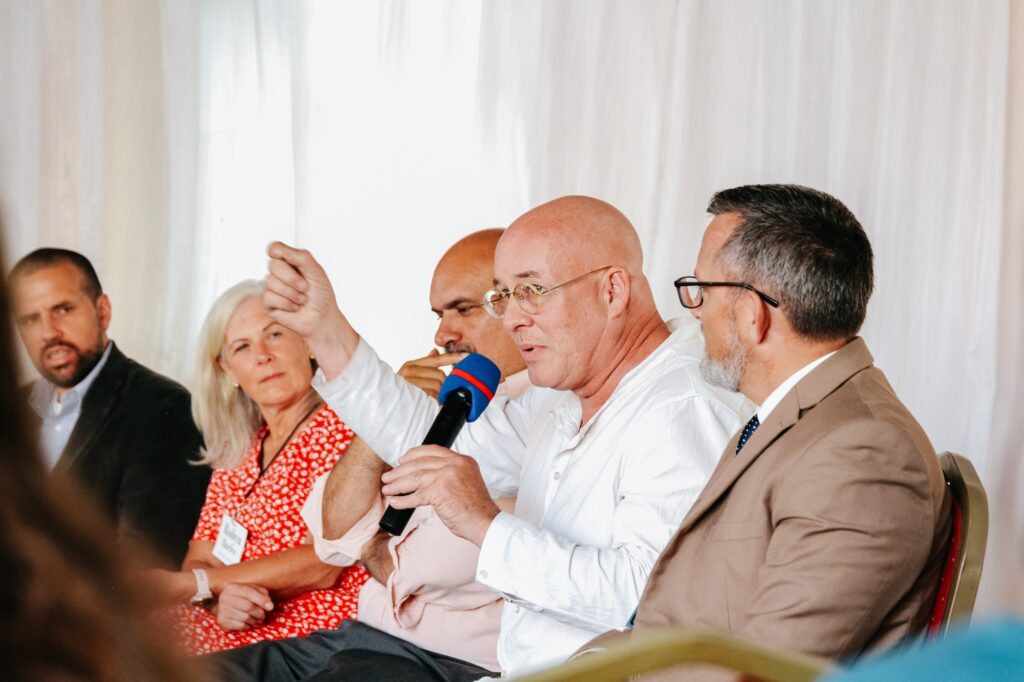
The Rafiki Foundation hopes to see a thousand schools converted to Rafiki’s classical curriculum in the next decade. Photo courtesy of Rafiki Foundation.
If Rafiki’s ambitious efforts prove successful, Horner anticipates a future where African students will be able to engage classical literature side-by-side with the rich works of their heartland.
Horner said, “I want to watch them run their own Socratic dialogues about similarities and differences between East African, Levantine, North African, European, and American cultures. What can they learn from us? What can we learn from them? Where are we both responding to some universal that God has woven into the fabric of His universe?”
To learn more about the Rafiki Foundation and explore opportunities to get involved in their mission, see rafikifoundation.org.

The Master’s University and Seminary admit students of any race, color, national and ethnic origin to all the rights, privileges, programs, and activities generally accorded or made available to students at the school. It does not discriminate on the basis of race, color, national and ethnic origin in the administration of its educational policies, admissions policies, scholarship and loan programs, and athletic and other school-administered programs.
21726 Placerita Canyon Road
Santa Clarita, CA 91321
1-800-568-6248
© 2025 The Master’s University Privacy Policy Copyright Info
| Cookie | Duration | Description |
|---|---|---|
| cookielawinfo-checkbox-analytics | 11 months | This cookie is set by GDPR Cookie Consent plugin. The cookie is used to store the user consent for the cookies in the category "Analytics". |
| cookielawinfo-checkbox-functional | 11 months | The cookie is set by GDPR cookie consent to record the user consent for the cookies in the category "Functional". |
| cookielawinfo-checkbox-necessary | 11 months | This cookie is set by GDPR Cookie Consent plugin. The cookies is used to store the user consent for the cookies in the category "Necessary". |
| cookielawinfo-checkbox-others | 11 months | This cookie is set by GDPR Cookie Consent plugin. The cookie is used to store the user consent for the cookies in the category "Other. |
| cookielawinfo-checkbox-performance | 11 months | This cookie is set by GDPR Cookie Consent plugin. The cookie is used to store the user consent for the cookies in the category "Performance". |
| viewed_cookie_policy | 11 months | The cookie is set by the GDPR Cookie Consent plugin and is used to store whether or not user has consented to the use of cookies. It does not store any personal data. |
Notifications